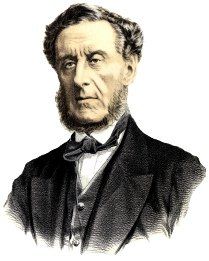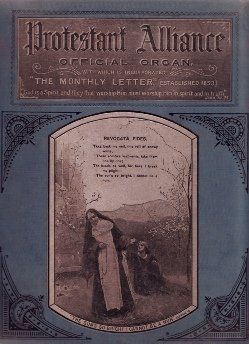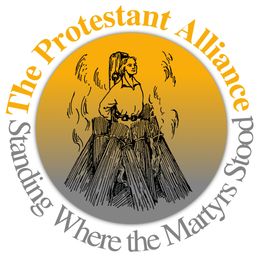HISTORY
The early history of the Protestant Alliance is not well recorded. This is largely due to the loss of records which were burnt as a result of enemy bombing in the Second World War.
It would appear that after some years of locally based effort by various small Protestant societies a coming together of these bodies took place around 1845 which resulted in the constituting of The Protestant Alliance.
The Alliance was founded by Anthony Ashley-Cooper, the 7th Earl of Shaftesbury.
The 19th Century saw the rise of two movements that rightly gave cause for concern amongst Evangelicals. On the one hand the Tractarians were working to introduce ritualism within the Anglican Church while Roman Catholicism sought to establish itself again in the British Isles. On the 14th July 1833 the Assize sermon preached at Oxford by John Keble had marked the launching of the Tractarian Movement while the Catholic Emancipation Bill of 1829 had given to Rome a new confidence.
The Roman Church had been defeated as a power within the British Isles at the time of the Glorious Revolution (William III) 1688 - 1690 culminating in the Battle of The Boyne. It took over a century for her to recover herself. The various Acts of Settlement had guaranteed the nation a Protestant throne which in turn maintained civil and religious liberty. In 1829 the Emancipation Bill, which Lord Shaftesbury voted for, gave Roman Catholic citizens the right to vote and sit as Members of Parliament. Shaftesbury reasoned that the Roman Catholic ratepayer was as much entitled to the vote as the Protestant ratepayer but with the Bill’s passing it soon became clear that the Roman Church was not content with equal rights but rather sought to make herself the National Church again.
The first endeavour of the Protestant Alliance was the producing and circulating of a publication called “The Monthly Letter”. Initially its circulation was less than one thousand. By 1900 it had changed format and was published as “The Protestant Alliance Magazine” and had a circulation of 18,000 copies.
Around 1853 “The Protestant Association” was incorporated into the Alliance. This society had been founded in 1779. Back in 1787 it had been active in seeking repeal of legislation relaxing restriction on Roman Catholics. A petition to be placed before Parliament had been organised. Many thousands gathered at the time of its presentation. That evening the so called “Gordon Riots” broke out. The Protestant Association was blamed for this civil disorder, yet records show that the Protestant Association published handbills appealing for calm. Likewise court records show that no rioters arrested were members of the Association.
The strength of Protestant feeling in those times and throughout the 19th century is hard to imagine today. Such was the enthusiasm for the cause that once a duel was fought between the Protestant Association leader, The Earl of Winchilsea, and The Duke of Wellington. Fortunately neither was hurt.
The numbers that gathered for Protestant meetings give an insight into the strength and influence of the Alliance from its inception and well on into the 20th Century.
Three days of meetings held in Edinburgh had in attendance 746 ministers, a number of aristocrats and a Member of Parliament. The Annual Children's Protestant Demonstrations held at Alexandra Palace were reported in the National Press. Many thousands of children from around the London area would gather for these occasions.
Another avenue of the work was the erection and renovation of memorials to the Protestant Martyrs, the Smithfield Memorial being unveiled on 11th March 1870. The Dartford Memorial was not only renovated but a fine meeting hall was also built.
Protestant strength of feeling was such that the voice of the Protestant Alliance was listened to by politicians. The Parliamentary work, especially at election time was very extensive. Canvassers were sent into various constituencies to work for the candidates of Protestant conviction. Winston Churchill in correspondence with the Protestant Alliance wrote that he was, "…in general agreement with the principles advocated by the Protestant Alliance, and has formerly been fortunate in obtaining its support (notably at the by-election of 1899)."
In the Ulster Crisis of 1912 the General Secretary of the Alliance, Mr. H. Fowler, went over to Belfast for Ulster Day. He was met by Captain James Craig. Mr. Fowler, as a representative of mainland Protestant support for Ulster Protestants, addressed the vast crowds that gathered.
In the First World War the Belgian refugees that fled to the British Isles were greatly aided by the Alliance. Many letters of thanks were received from those helped. Evangelistic work and services in French and Flemish were also undertaken. Throughout the history of the Alliance many monks, nuns and priests were evangelized. Some were converted and the Alliance further helped them to leave the Roman Church. On occasions dramatic circumstances surrounded nuns leaving convents, the Roman Church seeking to imprison and retain those nuns who expressed a desire to leave.
During the inter-war years the ministry of the Alliance continued and it was during this period that in 1931 the Amersham Martyrs Memorial was erected. It was the Prayer Book controversy however that dominated these years. The ritualists, with whom the Alliance had contended from its beginning, had unfortunately continued to gain strength and within the Anglican Church were now filling many offices including Bishoprics. When a new Prayer Book was brought out it contained many romanizing tendencies. Before it could be legally used within the National Church Parliament had to vote to sanction its use. A great campaign was mounted by the Protestant Alliance to have Parliament reject it, which they did in 1927 and 1928. The ritualistic clergy however went ahead and used this Prayer Book. Despite efforts by the Protestant Alliance and other Protestant societies neither Parliament nor the Church would discipline those clerics illegally using the rejected Prayer Book.
The great changes in society brought about by the First World War were further compounded by the Second. Ritualism and liberalism that were within the main Protestant denominations made deeper inroads after the Second World War. Society was greatly affected by the wars and church attendance by the populace greatly declined. After the War our famous Strand Office had to be vacated. The work had come full circle. For by then its main witness was the publishing of its magazine as it was in the early years of the Alliance.
Mr. O. T. Taylor who acted as Secretary, Treasurer and Editor from 1946 administered the work from a room in his home. In 1963 the Alliance was able to call Rev. A.G. Ashdown into the work. For over thirty years Mr. Ashdown ministered with the Alliance and was the General Secretary from 1972 to 1993.


